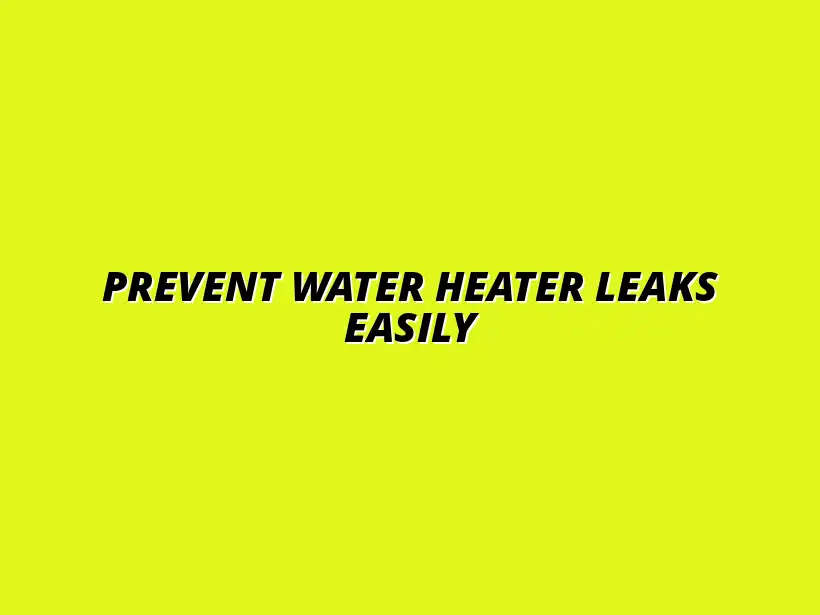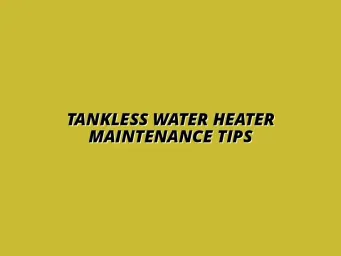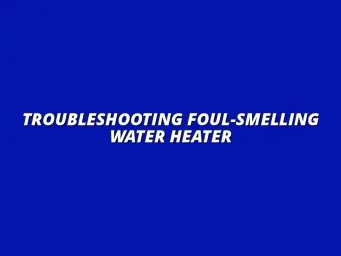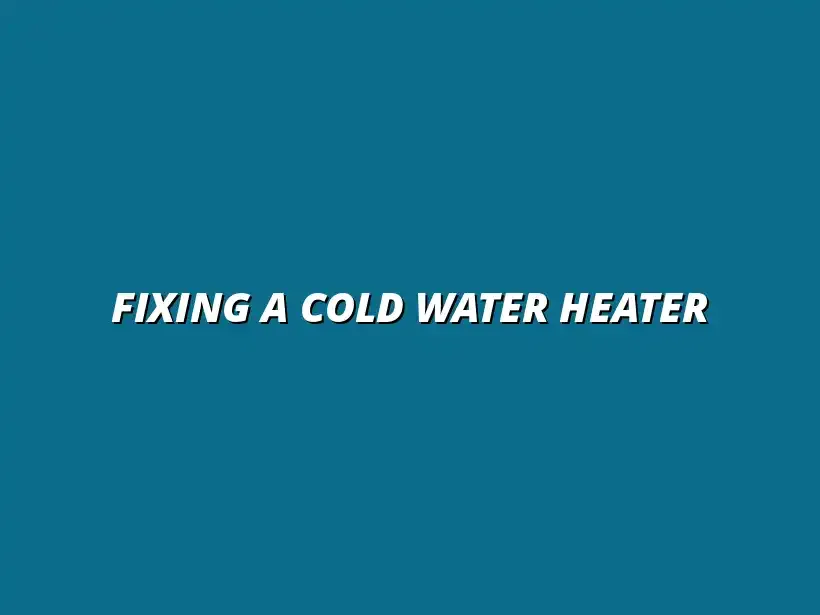
Prevent Water Heater Leaks Easily
Understanding the Importance of Water Heater Maintenance
Water heaters are essential appliances in our daily lives, providing us with hot water for showers, washing dishes, and laundry. However, many homeowners overlook the importance of maintaining these systems. Regular maintenance can prevent costly repairs and ensure your water heater operates efficiently for years to come!
When we neglect water heater maintenance, we increase the risk of leaks, inefficient heating, and even system failure. Understanding why maintenance is vital can motivate us to take proactive steps. By investing a little time and effort, we can avoid major headaches down the line. For more advice on regular checks, see this guide on regular bathroom water heater checks.
The Consequences of Water Heater Leaks
Water heater leaks can lead to serious complications in any home. Not only do they affect your day-to-day activities, but they also pose significant risks to home safety and structure. A leak can damage floors, walls, and even electrical systems, making it crucial to address leaks immediately.
Moreover, leaks can encourage mold growth, compromising indoor air quality and leading to health issues. This means that staying vigilant about leaks isn’t just about preserving your property; it’s about keeping you and your family safe!
Impact on Home Safety and Structure
When a water heater leaks, the first concern should be the safety of your home. Here are some impacts to consider:
- Water damage can weaken the foundation of your home.
- Wet areas can attract pests and create an unsafe environment.
- Increased humidity may lead to mold or mildew growth.
All these factors can create long-term issues that affect your home’s structure and your family's health. Repairing these damages can be much more expensive than regular maintenance to prevent leaks!
Financial Implications of Ignoring Leaks
Ignoring leaks can also hit your wallet hard. The costs associated with repairing water damage often far exceed the expenses of routine maintenance. Here are some financial implications to keep in mind:
- Higher water bills due to wasted resources.
- Repair costs for damaged walls and flooring.
- Potential increases in homeowner's insurance premiums.
In the long run, maintaining your water heater can save you money and headaches by preventing leaks and the subsequent damage they cause!
Routine Checks to Prevent Water Heater Leaks
To keep your water heater functioning properly, incorporating routine checks into your schedule is essential. Regular inspections can catch minor issues before they escalate into major problems. Learning how to prevent plumbing leaks with regular inspections is a great preventative measure. Here is a simple checklist to help you stay on top of your water heater maintenance!
By dedicating just a few minutes each month to inspect your water heater, you can protect your home and ensure that your system runs smoothly. Preventative maintenance is key!
Essential Components to Inspect Regularly
During your routine checks, focus on essential components that can impact the performance of your water heater. Here are a couple of components to routinely inspect:
- Temperature and Pressure Relief Valve
- Drain Valve for Sediment Build-up
Keeping these parts in good working condition can help prevent leaks and ensure your water heater operates efficiently! Regular inspections can save you both time and money in the long run. For more detailed guidance on annual inspections, you can refer to our guide on annual water heater inspection tips.
Checking the Temperature and Pressure Relief Valve
The temperature and pressure relief valve is crucial for safety. It prevents excess pressure from building up in the tank, which could lead to dangerous situations. Make sure to:
- Test the valve once a year by lifting the lever.
- Check for any signs of leaks around the valve.
- Replace the valve if it shows any signs of damage.
Regularly checking this valve can keep your water heater safe and functioning well!
Inspecting the Drain Valve for Sediment Build-up
The drain valve is another important component that can contribute to leaks if not properly maintained. Over time, sediment can build up in the tank, leading to clogs and potential leaks. Follow these steps for regular inspection:
- Open the drain valve to check for sediment.
- Flush the tank at least once a year to remove build-up.
- Replace the valve if it becomes corroded or stuck.
By keeping the drain valve clear, you can extend the life of your water heater and prevent leaks!
Visual Inspections of the Water Heater
In addition to checking essential components, conducting visual inspections of your water heater is crucial. By regularly looking for signs of wear and tear, you can catch potential issues early. Preventing pipe leaks with proper maintenance is another important aspect of home maintenance. Here are some things to keep an eye out for:
- Signs of corrosion or rust on the tank
- Water accumulation around the base of the heater
Visual inspections are a simple yet effective way to ensure your water heater remains in good working condition. They can help prevent leaks and keep your home safe!
Looking for Signs of Corrosion or Rust
Corrosion and rust are serious indicators that something might be wrong with your water heater. Learn how to prevent corrosion in water heaters to extend their lifespan. Regularly check for:
- Discoloration of the tank surface.
- Flaking or pitting on any metallic parts.
- Rusty water coming from the taps.
Addressing corrosion early can prevent leaks and extend the lifespan of your heater!
Detecting Water Accumulation Around the Heater
Water accumulation around the base of the heater is a clear red flag that should not be ignored. During your visual inspections, look for:
- Puddles of water near the heater.
- Wet spots on the floor or walls.
- Musty odors indicating mold growth.
Finding excess moisture early allows you to address the issue before it escalates into a bigger problem. Keeping your water heater dry is vital for maintaining its efficiency and safety!
Common Questions About Water Heater Leaks and Maintenance
As a homeowner, it's essential to stay informed about potential issues with your water heater. One common concern that arises is leaks. Many homeowners might wonder what the early signs of a water heater leak are and what actions to take if they discover one. In this section, we will address these questions and provide clear guidance to help you maintain your water heater effectively. If you need a plumber in Birmingham, find a local plumber here.
Understanding the symptoms of a leak can save you from significant damage and costly repairs. By recognizing these early signs and acting promptly, you can protect your home and ensure your water heater runs efficiently. Let’s explore these critical aspects for better peace of mind!
What Are the Early Signs of a Water Heater Leak?
Detecting a water heater leak early can prevent major issues down the line. Here are a few common symptoms to look out for:
- Visible water pooling or damp spots around the heater
- Unexplained increases in your water bill
- Rust or corrosion on the tank or fittings
- Moisture on the floor or walls near the heater
Another indicator to consider is the sounds that your water heater makes. If you hear unusual noises like popping or rumbling, it may suggest sediment build-up or even a leak that needs immediate attention. Being aware of these signs helps you take action before a small leak turns into a big problem.
Recognizing Leak Symptoms Before They Become Major Issues
Preventing a leak from developing into a more significant concern often hinges on your ability to recognize symptoms early. Regularly inspect your water heater and pay attention to changes in water temperature or pressure. If the water heater feels excessively hot to the touch or shows uneven heat distribution, it could be a sign of a malfunction.
Additionally, staying informed about your water heater's maintenance history is key. Make note of any past repairs or issues, as this can help you identify patterns that could lead to future leaks.
Understanding the Noises that May Indicate a Problem
As mentioned earlier, the sounds your water heater makes can provide essential clues about its condition. If you hear hissing or whistling sounds, it may indicate that steam is escaping, which could be a sign of a serious issue. Similarly, if you notice a banging noise, it could be caused by water heating too quickly, leading to pressure build-up.
Paying attention to these noises can help you determine when to seek professional assistance. Remember, addressing issues early can save you time, money, and hassle in the long run!
What Should You Do if You Discover a Leak?
Discovering a leak can be alarming, but staying calm is important. The first step is to minimize any potential damage. If you need to fix a leak, our guide on fixing a leaking water heater can help. Here’s what you should do:
- Turn off the power supply to the water heater.
- Shut off the water supply to stop further leaking.
- Use towels or a mop to clean up any standing water.
- Inspect the extent of the leak and identify its source.
By taking these immediate actions, you can reduce the risk of water damage to your home. After controlling the leak, you can then decide whether to attempt a fix yourself or call in a professional.
Immediate Actions to Take to Minimize Damage
In the case of a leak, it’s vital to act quickly. If you're unable to determine the source of the leak, or if it seems substantial, it’s best to contact a qualified technician for help. They can assess the situation, provide expert advice, and make any necessary repairs.
Additionally, if you’ve turned off the water supply, consider using a bucket to catch any remaining drips until help arrives. This simple step can further protect your home from water damage.
Temporary Solutions vs. Permanent Repairs
Sometimes, you may be able to implement a temporary solution to stop the leak. For instance, using plumbing tape or a sealant might provide a short-term fix until a professional can make a permanent repair. However, it’s essential to understand that these fixes are not long-term solutions.
Ultimately, while temporary fixes can be helpful, they should not replace proper repairs. Regular maintenance and professional inspections are crucial for ensuring your water heater's longevity and efficiency!




